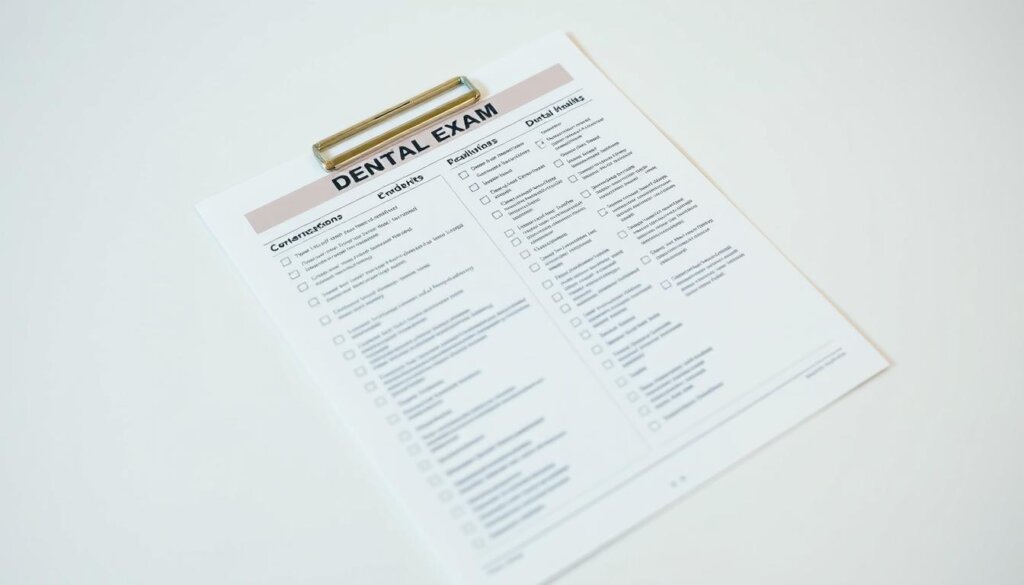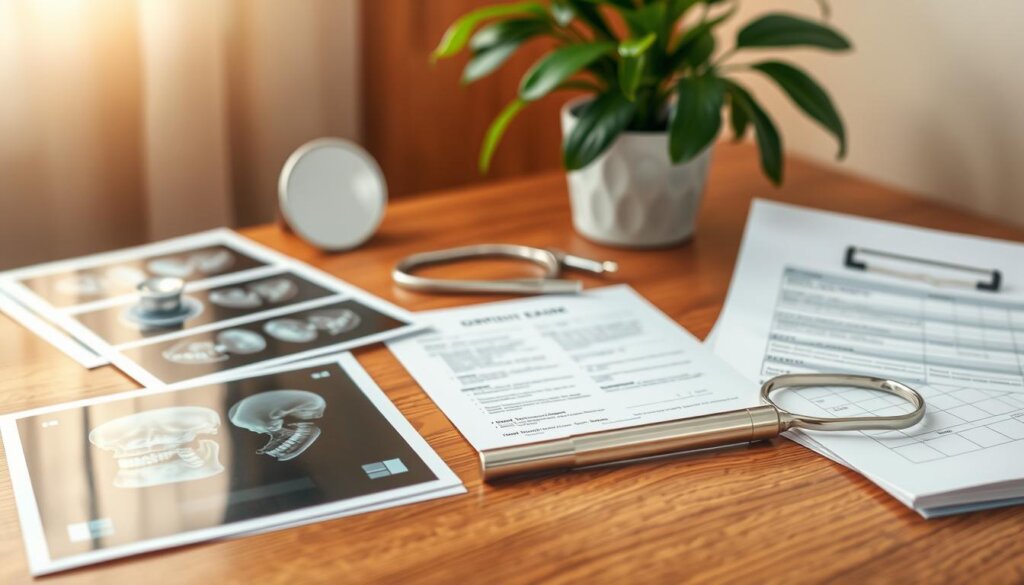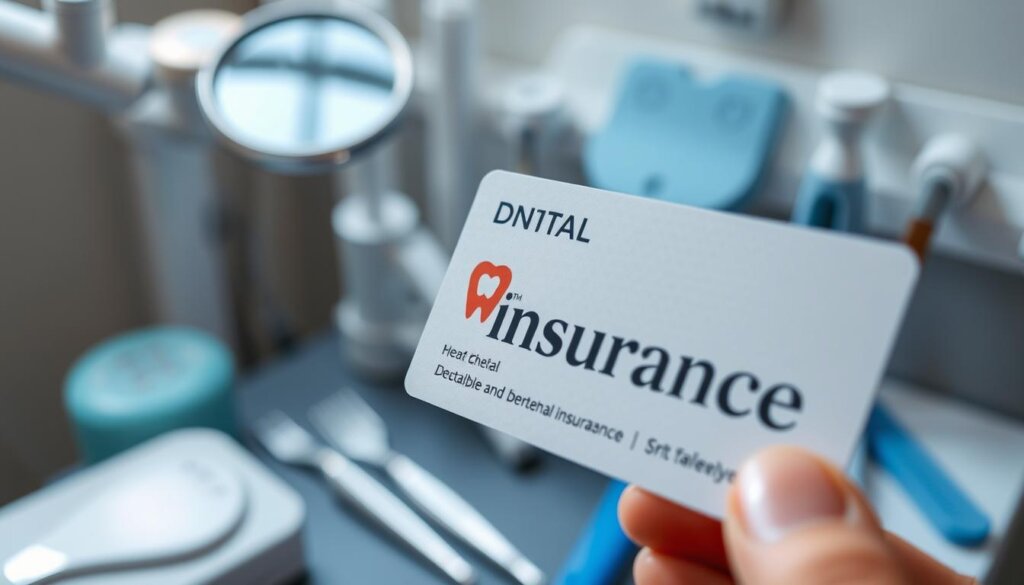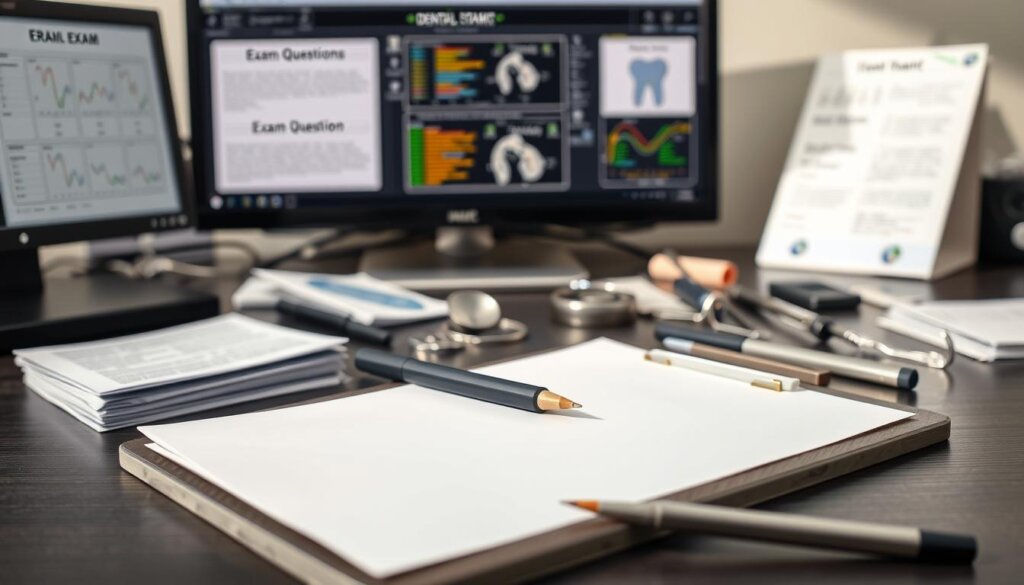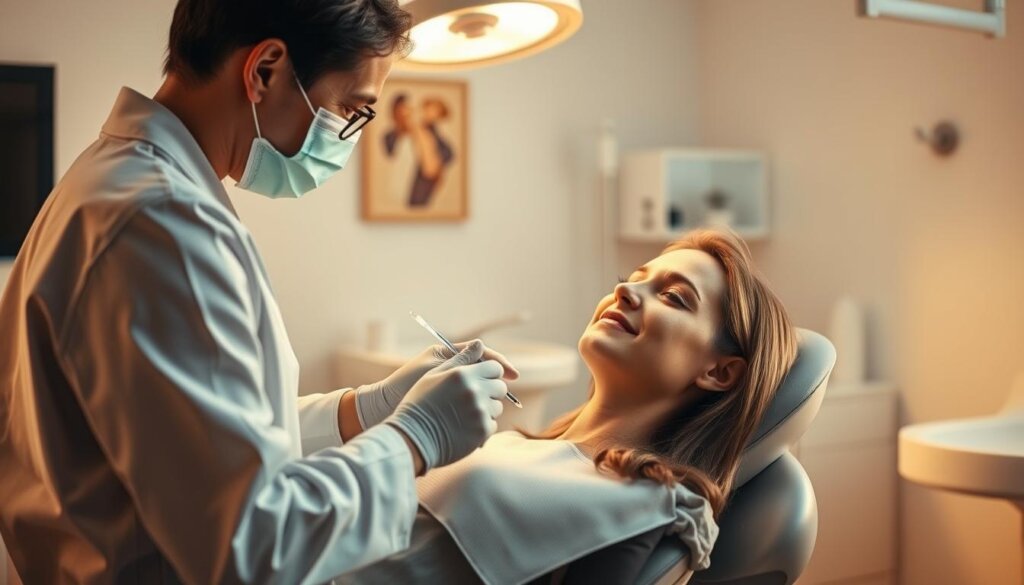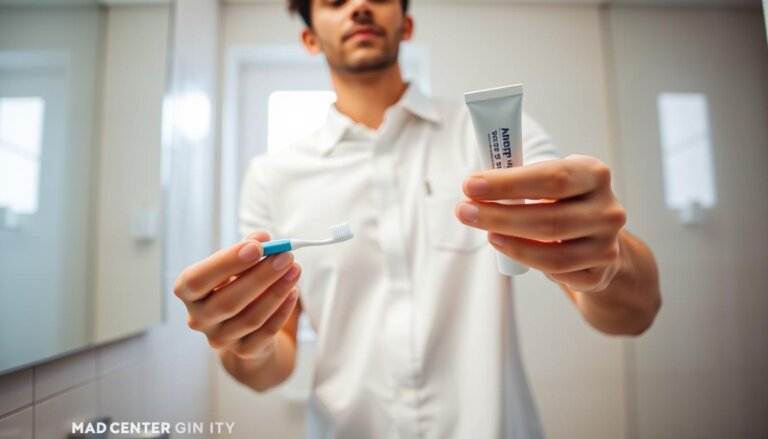How Do I Prepare for a Dental Exam?
Around 100 million Americans don’t go to dental checkups yearly, says the American Dental Association. But, visiting the dentist regularly is key to keeping your mouth healthy. So, knowing how to get ready for a dental exam is very important for those who want to make their visits better. Getting ready for a dentist visit helps the appointment go smoothly and can even improve the results.
Getting ready for a dental exam involves some important steps. This ensures you feel calm and makes the visit worthwhile. First, make sure to brush and floss every day for months before your appointment. This is crucial. It keeps your teeth and gums healthy and shows your dentist you care about your oral hygiene. For those who get nervous about dental visits, talking about sedation options before the appointment can help.
It’s smart to keep a record of any dental problems or changes in your mouth. This makes your dental check more focused and effective. Also, don’t forget to check your dental insurance to know what’s covered and what you’ll have to pay for. Lastly, always tell your dentist about any changes in your health or any new medicines you’re taking. This is very important for a good dentist visit.
Key Takeaways
- Understand the importance of dental exams and start taking care of your teeth well before your visit.
- Be clear about your dental symptoms and health history for a better dental check-up.
- Talk about your fears with your dentist to find out about sedation options for a more relaxing visit.
- Know your dental insurance details early to be clear on costs and avoid surprises.
- Keeping your health information and medication list up to date helps your dentist give you the best care possible.
Understanding the Importance of Dental Exams
Regular dental exams are crucial for good oral health and early problem detection. They are not just for prevention but also help you learn proper oral care. This way, small issues can be fixed early, avoiding bigger problems later.
Getting ready for a dental visit means knowing what will happen and understanding common procedures. A dental exam checklist, combined with this knowledge, makes visits smoother and more helpful.
What to Expect During a Dental Exam
- A review of your dental and medical history to update any new health issues or medications.
- A thorough examination of teeth, gums, and mouth to check for signs of decay, gum disease, or other oral health conditions.
- X-rays may be taken to provide a deeper insight into your dental health, unseen by the naked eye.
- Discussion about oral hygiene practices and dietary habits that could influence your oral health.
Common Procedures Done During Exams
- Teeth cleaning to remove plaque and tartar buildup that regular brushing and flossing might miss.
- Fluoride treatments to help strengthen the enamel and prevent decay.
- Sealants may be applied to the grooves of the back teeth to prevent food particles and bacteria from lodging.
- Dental scaling and root planing for patients showing signs of gum disease.
Knowing what happens in dental exams and preparing with these tips can make you more comfortable and confident. Good communication with your dentist and regular oral hygiene are key for great dental health.
Setting Up Your Appointment
Starting your journey to great oral health begins with smart choices about your dental exam prep. Choosing the right dentist and making your appointment carefully are key first steps. These steps make sure your visit is tailored just for your health needs.
When choosing the right dentist, look for experts who fit your dental needs and make you feel comfortable. Whether you need general or specialized care, picking the right dentist is crucial for a successful exam. A welcoming office and wide range of services play a big role in reaching your dental health goals.
Scheduling your appointment is very important. It’s best to have check-ups every six months, though some might need more or less frequent visits based on their oral health history. When you make your appointment, think about your daily schedule. Choose a time that fits easily into your day and gives you enough time for a thorough check-up.
For more tips on getting ready for your visit or knowing what to expect, please visitour detailed guide on dental exams and. This guide offers more advice on dental exam prep and how to get the most from your visits.
In conclusion, choosing your dentist carefully and planning your appointments well gives you more control over your dental health. Being proactive in your dental care ensures you get personalized treatment. It also plays a big part in keeping your overall health good. Remember, preparing for your dental exam is the first step towards a lasting, healthy smile.
Preparing Your Oral Health History
Getting ready for a dental exam involves a few key steps. You need to collect your past dental records and list all medications and allergies you know of. This helps your dentist give you personalized care and avoid any problems.
Providing a full dental health history means your treatment will suit your health needs well. It’s smart to send any medical records to your new dentist early. This ensures your care continues smoothly and keeps you from waiting longer than needed.
- Gathering Medical Records: Ask for your dental records from past dentists or your doctor. This includes x-rays, notes, and details of past treatments.
- Listing Medications and Allergies: Make a complete list of medicines you’re taking, including ones you buy without prescriptions and supplements. Point out any allergies, particularly to meds, latex, or anesthesia, that could impact how you’re treated.
In summary, having a complete dental health history ready makes your dental visits better. It lets your dentist create a safe, effective treatment plan just for you. This preparation is key to getting the best care possible.
Practicing Good Oral Hygiene
Good oral hygiene is key for a smooth dental exam. Cleaning your teeth before a dental exam makes the cleaning quicker. It also keeps your gums and teeth healthy. Moreover, you should avoid foods that complicate dental appointment preparation.
Brushing and Flossing Before the Exam
Before your appointment, clear away plaque and tartar. Here’s how:
- Brush twice daily with fluoride toothpaste, particularly the night before and morning of your exam.
- Use floss to remove food and plaque your toothbrush can’t get.
- Try an antiseptic mouthwash to kill bacteria and freshen breath.
Avoiding Certain Foods
The food you eat affects your dental health, especially before an appointment. Avoid these for a better dental appointment preparation:
- Stay away from sticky, sugary foods that cause plaque.
- Avoid hard candies or foods that might damage teeth or dental work.
- Skip drinks like red wine, coffee, and tea that can stain teeth.
By following these strategies, you make your dental visit quicker and more comfortable for you and your dentist.
Understanding Dental Insurance
Before your next dental check-up, it’s important to understand what your dental insurance covers. This helps with your budget and ensures you know your benefits. We’ll look at how to check your coverage and explain terms like co-payments and deductibles.
Review your dental insurance details before your appointment to avoid unexpected costs. Find out if services like cleanings and X-rays are included. Dental insurance varies, so examining your policy is key.
Checking Your Coverage
Start by calling your insurance provider for a complete list of covered exams and treatments. This step clears up your coverage and prepares you for any costs you might need to pay yourself.
Understanding Co-Payments and Deductibles
Co-payments are what you pay for certain dental services, not including premiums or deductibles. Deductibles are what you pay before your insurance pays its part. Knowing these terms helps you manage your dental visit costs.
Knowing your dental insurance, co-payments, and deductibles inside out helps control dental health costs. It lets you plan for expenses and make the most of your insurance benefits.
Preparing Questions for Your Dentist
Before your dental visit, it’s smart to prepare some specific dental exam questions. This helps you use your time well. Note down any worrying signs or symptoms you’ve observed related to your dental health concerns. Doing this will make your conversation with your dentist more productive.
Here’s a list of important questions to ask at your appointment. They’re divided into general and specific ones. This ensures you cover all bases for a well-informed dental care plan.
| General Dental Exam Questions | Specific Questions About Dental Health Concerns |
|---|---|
| What should my daily oral hygiene routine entail? | Have there been any advancements in treatment options for gum disease? |
| How often should I schedule dental visits? | I’ve noticed sensitivity in a tooth; what could be causing this? |
| Can you explain the results of my latest x-rays? | Are there signs of erosion that I need to be worried about? |
| What are the best products to use for my dental care? | Given my medical history, are there specific dental issues I should watch for? |
Asking these dental exam questions is essential. They address major dental health concerns and lead to better preventive care. Remember to mention any new discomforts or symptoms. This ensures you stay on top of your dental well-being.
Arriving at the Dental Office
Getting ready for a dental visit means getting there early enough. Arriving early lets you fill out forms, update your dental info, or calm down if you’re feeling nervous.
- Arriving Early: Being 15 minutes early gives you time to relax and eases worries about dental visits.
- What to Bring: Always bring a dental exam checklist with your ID, insurance card, medicine list, and any old dental records. Also, jot down any questions for your dentist.
It’s smart to double-check your appointment the day before. This helps avoid mix-ups and makes sure the time fits the dental office’s schedule.
Following these tips, you’re not just getting ready for a check-up. You’re making sure your visit goes smoothly, covers everything, and is stress-free. Being prepared shows you care about your dental health and improves the care you get.
Managing Dental Anxiety
Visiting the dentist often makes people feel stressed and uncomfortable. This fear, known as dental anxiety, can harm one’s mental health and stop them from getting regular dental care. This leads to more dental problems. It’s important to understand and address this fear through calming techniques and sedation dentistry.
- Communication: Talking about your fears with your dentist can help change the treatment to make you less anxious.
- Distraction Techniques: Listening to music or focusing on something else can help reduce anxiety during dental appointments.
- Professional Guidance: Dentists know how to help scared patients. They use methods like guided imagery and breathing exercises.
If simple methods don’t ease the anxiety, sedation dentistry is another option. It uses sedatives, from mild ones like laughing gas to stronger types like oral sedatives or IV sedation. The type used depends on how anxious you are and the dental procedure.
Looking into sedation dentistry can make a scary dentist visit comfortable and pain-free. It’s important to talk about sedation choices with your dentist. This ensures you know the best and safest options for you.
- Consultation: Talking in detail with your dentist about sedation choices helps find the right method for you.
- Customized Sedation Plans: Dentists can make a sedation plan for you, based on your fears and health background.
In short, managing dental anxiety is key to keeping your mouth healthy. Through good communication, tailored calming methods, and professional sedation choices, dental visits can be less stressful and more helpful.
The Role of Technology in Exams
Technology, especially digital X-rays, has changed dental exams. It makes exams quicker and more comfortable for patients. It also makes diagnoses more precise.
Digital X-rays Explained
Digital X-rays are a key part of modern dental exams. They give clearer, more detailed pictures than old X-ray methods. Using digital sensors, they cut down on radiation and let dentists view images right away.
Benefits of Dental Technology
Modern dental tech makes exams and treatments better and faster. It helps dentists find problems early. This can save patients from needing major, expensive treatments later.
| Feature | Benefits |
|---|---|
| Reduced Radiation Exposure | Significantly lower than traditional X-rays, making it safer for patients and clinicians. |
| Enhanced Image Quality | Provides clearer, more detailed images for accurate diagnosis. |
| Immediate Image Availability | Speeds up the review process, allowing for quicker treatment planning. |
| Environmental Impact | Reduces chemical and material waste associated with film X-rays. |
Post-Exam Care
After your dental exam, it’s key to follow the dental exam follow-up advice from your dentist. This might mean specific treatments, habits to prevent problems, or tips for care at home. These steps help keep your mouth healthy.
Knowing when to have your next dental exam is just as important. Depending on your health, you might need to go more often than others. This helps catch and fix problems early.
- Following your dentist’s advice can stop small issues from getting worse.
- Having exams regularly is essential for spotting and managing problems early.
Several things affect when you should have your next exam. These include your current dental issues, risk of gum disease, and overall mouth health. Most people need a check-up every six months.
By making these recommendations a part of your routine, you can keep your oral health in check. It also reduces the chance of dental emergencies.
Understanding Dental Terminology
Learning about dental terms and understanding dental procedures helps patients and dentists communicate better. Knowing what happens during dental care leads to better health and more satisfaction.
We’ll go over some important dental terminology and common procedures. This will help patients talk more effectively with their dentists during visits.
- Amalgam: A commonly used dental filling material, composed of mercury mixed with silver, tin, or other metals.
- Bruxism: This term refers to the involuntary or habitual grinding of the teeth, typically during sleep.
- Caries: Scientific term for tooth decay or dental cavities caused by bacterial infection.
- Gingivitis: Inflammation of the gums, often the initial stage of gum disease, which can lead to more severe periodontal issues if not treated.
- Periodontitis: Advanced gum disease involving inflammation and destruction of the structures supporting the teeth, including the alveolar bone.
Common Procedures Explained
We’ll keep explaining dental terminology by looking at common dental procedures:
| Procedure | Description |
|---|---|
| Root Canal | A treatment to repair and save a severely damaged or infected tooth instead of removing it. |
| Scaling and Root Planing | A deep cleaning procedure below the gumline used to treat gum disease and prevent the progression of periodontitis. |
| Crowns | Artificial coverings over a tooth, typically used to restore its shape, size, strength, and appearance. |
| Veneers | Thin shells crafted from porcelain or resin that cover the front of the teeth to improve their aesthetic appearance. |
| Bonding | A procedure in which a tooth-colored resin is applied and bonded to the surface of the tooth, often performed to repair damaged teeth. |
Understanding dental procedures and terms makes the process less scary and helps patients make better choices about their oral health. It’s important for everyone to keep learning about this.
Aftercare for Dental Procedures
Taking care of yourself after a dental procedure is key for a good recovery. It’s important to follow post-dental exam care advice to heal well and avoid any issues. Let’s go over some basic tips on how to care for yourself and ease any discomfort you might feel.
- It’s crucial to stick to the advice your dentist gives you for dental procedure aftercare.
- Keep the area clean by brushing and flossing gently. Be careful not to disturb the healing process.
- Stay away from very hot, cold, or hard foods. Choose soft foods instead to make eating easier and protect the sore spot.
- Make sure to take any painkillers or antibiotics as your dentist tells you, to help with pain and stop infections.
Managing Discomfort:
- Putting a cold pack on your face off and on can help reduce swelling and pain where the work was done.
- If the pain doesn’t go away, see your dentist again for more advice on post-dental exam care.
Watching how you feel after dental work is crucial to catch and fix any problems early. You should get in touch with your dentist if you have bad pain, swelling, or think you might have an infection.
Financial Considerations
It’s key to grasp how money matters affect our dental health. This knowledge allows us to choose our dental care wisely. Dental exam costs and dental payment plans are crucial for getting the care we need without breaking the bank.
We’ll look at two main factors that impact how we handle our dental care costs. These are the price of dental check-ups and what payment plans dental offices offer.
Understanding Costs of Services
Dental exam prices can change a lot depending on where you are, what you need done, and the dentist’s office rules. Some services might just be a regular cleaning. But others might include x-rays or more detailed checks.
Payment Plans and Options
To help with the costs upfront, many dentists offer dental payment plans. These plans help spread out the expense over time. That way, patients can afford the care they need right away instead of waiting due to money issues.
| Treatment | Average Cost | Payment Plan Availability |
|---|---|---|
| Initial Consultation | $50 – $200 | Yes |
| Standard Cleaning | $75 – $200 | Yes |
| Comprehensive Exam | $100 – $300 | Yes |
| Digital X-rays | $60 – $150 | Often Included in Plans |
Knowing about dental exam costs and dental payment plans helps us plan better. This way, we can get the dental care we need easily. And that leads to healthier teeth and gums.
Staying Informed About Dental Health
The world of dental care keeps changing. It’s very important for both doctors and patients to stay updated on new findings and advice in dental health. This knowledge helps people make better choices for their mouth care. It also encourages them to keep their teeth clean. There are many resources for learning more, like the American Dental Association (ADA)’s helpful information.
Reading up on dental health teaches us why regular dentist visits are crucial. These visits help find and treat problems early. This usually means easier and less painful treatments. So, preventing issues is key. Dentists, by staying informed, help guide their patients towards better dental health.
Educated patients make smarter choices and ask better questions at the dentist. Seeing your dentist regularly is not just routine—it’s vital for your overall health. Understanding dental terms and treatments lets patients control their dental health. In the end, knowing more means healthier smiles. And keeping up with dental education is good for everyone’s health.

